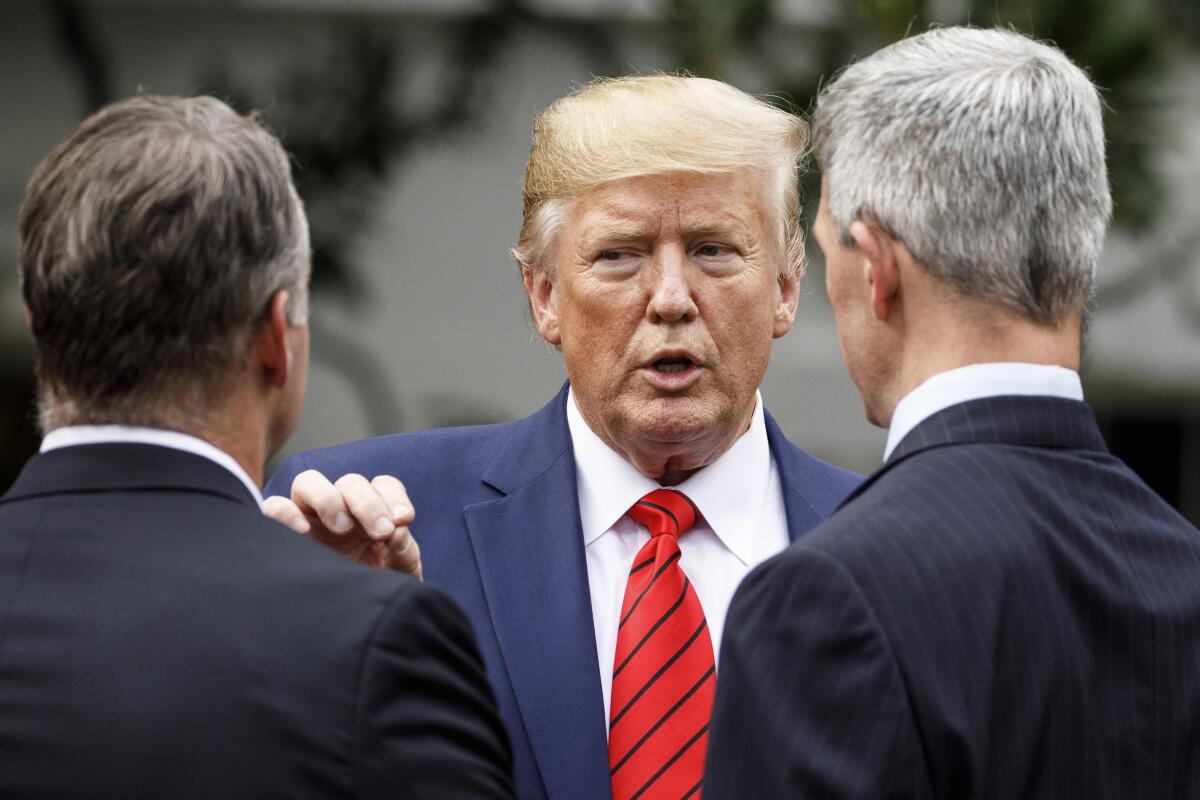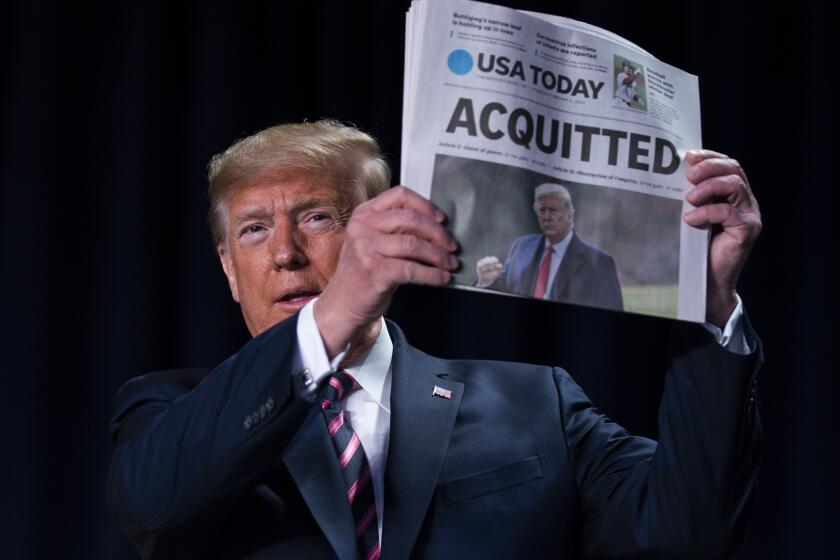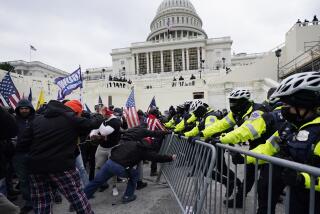News Analysis: Ukraine saga reveals how Trump has been aided and shielded by loyalists

WASHINGTON â Soon after President Trump took office nearly three years ago, he demanded to know who would serve as his Roy Cohn, the infamous bare-knuckled lawyer who had once defended him, mob bosses and gossipy celebrities in New York.
Judging by the whistleblower complaint at the heart of the impeachment inquiry, the president finally seems to have gotten his wish.
Not only does the complaint detail the presidentâs efforts to get Ukraine to investigate his political enemies, it suggests a deep bench of officials were willing to participate in his scheme or help keep it under wraps. Although the whistleblower said other White House officials were âdeeply disturbedâ by Trumpâs actions, none have come forward.
The scandal â potentially the most dangerous of Trumpâs tenure â is a vivid reminder of how he has bent the White House apparatus to serve him personally, much like the gilt-edged private company in Manhattan that bears his name and served as his launchpad into politics.
On Thursday, an enraged Trump lashed out at the whistleblower, at Democrats, and at the media, even as he seemed to joke about his yearning to stay at the pinnacle of power, a forever fixture in the global spotlight.
âWeâre looking good for another four years, and then if we want to another four and another four,â Trump told a private event in New York before he returned to Washington.
The House of Representatives intends to vote to impeach President Trump for abusing his office and obstructing Congress, a condemnation that only two other U.S. presidents have faced in the nationâs 243-year history. Despite the historic nature of the vote on charging the president with committing high crimes and misdemeanors, Trumpâs fate has been sealed for days, if not weeks in the Democratic-controlled House.
The complaint, which was partially redacted, portrays a president willing to hijack foreign policy to further his political interests. In July, Trump delayed nearly $400 million in foreign aid to Ukraine, a country that has been fending off Russian-backed separatists, and then told its president, Volodymyr Zelensky, a week later that he wanted a âfavor.â
Trump urged Zelensky to investigate CrowdStrike, a California-based cybersecurity company that had worked for Democrats in 2016, and Democratic presidential candidate Joe Biden, whose son Hunter had served on the board of a Ukrainian energy company.
According to a White House account of the call, Trump urged Zelensky several times to deal with Americaâs top law enforcement official, Atty. Gen. William Barr, and talk to his personal lawyer, Rudolph W. Giuliani, who does not work for the government, about the investigations.
Two months earlier, according to the complaint, Trump had instructed Vice President Mike Pence to cancel plans to attend Zelenskyâs inauguration and sent Energy Secretary Rick Perry instead. Trump also made clear he would not meet or talk with the new Ukranian president unless he was willing to âplay ballâ on the investigations, the whistleblower wrote.
âImpeachment is about restoring honor and integrity to the office.â Thatâs what Lindsey Graham said â in 1999.
Giuliani already was serving as Trumpâs private emissary to Ukraineâs new government. He urged officials to investigate issues that could help the president, spoke with State Department officials about his efforts, and pushed to get the U.S. ambassador to Ukraine recalled.
A career foreign service officer who had urged Ukraineâs government to crack down on corruption, Marie Louise Yovanovitch was ordered home in May. Giuliani told a Ukrainian journalist that she had been âpart of the efforts against the president.â
âI heard from multiple U.S. officials that they were deeply concerned by what they viewed as Mr. Giulianiâs circumvention of national security decision-making processes to engage with Ukrainian officials and relay messages back and forth between Kyiv and the president,â the whistleblower wrote.
On July 26, the day after Trump spoke by phone with Zelensky about Biden, two senior State Department officials visited the new leader in Kyiv.
U.S. spy chief Joseph Maguire testified to the House Intelligence Committee about the whistleblower complaint at the heart of the impeachment case.
Kurt Volker, the top U.S. envoy for Ukraine, and Gordon Sondland, the U.S. ambassador to the European Union, âprovided advice ... about how to ânavigateâ the demands that the president had made.â
Back in Washington, White House officials worried about how to handle records of Trumpâs phone call with Zelensky. Roughly a dozen White House officials â a mix of policy experts and duty officers in the Situation Room â had listened in, a standard practice for communications between heads of state.
Some were so disturbed by Trumpâs comments that they began talking to White House lawyers about âwhat had transpired,â the whistleblower wrote.
But senior White House officials moved to âlock downâ records of the call, the whistleblower wrote. They directed aides to move the electronic transcript to a computer system that normally holds highly classified material, a decision that one official described as âan abuseâ because the call âdid not contain anything remotely sensitive from a national security perspective,â according to the complaint.
More impeachment inquiry coverage
Read our full coverage of this weekâs events
Listen to audio of President Trump discussing the whistleblower at an event on Thursday
Catch up with a timeline on the impeachment inquiry
Learn how voters across the country reacted
Lastly, see where lawmakers stand on impeaching Trump
The whistleblower wrote it wasnât the first time the White House had used the classified network âsolely for the purpose of protecting politically sensitive â rather than national security sensitive â information.â
After the complaint was filed on Aug. 12, other officials also were willing to shield the president. Michael Atkinson, the intelligence communityâs inspector general, said it was an âurgent concernâ that required Congress to be provided a copy, but the acting intelligence director, Joseph Maguire, turned to the Justice Department for legal advice.
Barr has been one of Trumpâs most implacable legal defenders, and government lawyers determined that Trumpâs actions did not break the law, brushing off Atkinsonâs concerns.
Despite being stymied by Maguire and the Justice Department, Atkinson notified the House Intelligence Committee of the impasse on Sept. 9, the first crack in the secrecy that had shielded Trump.
The complaint became public less than three weeks later.
More to Read
Get the L.A. Times Politics newsletter
Deeply reported insights into legislation, politics and policy from Sacramento, Washington and beyond. In your inbox three times per week.
You may occasionally receive promotional content from the Los Angeles Times.














